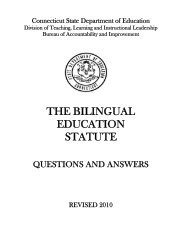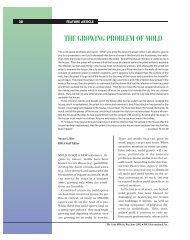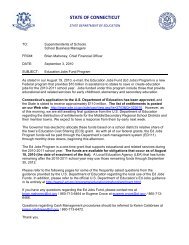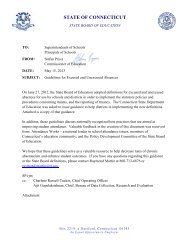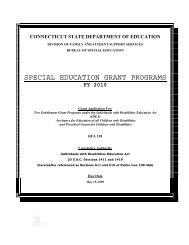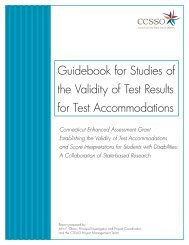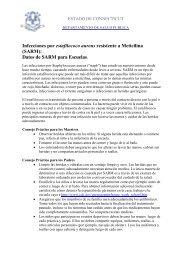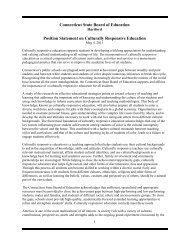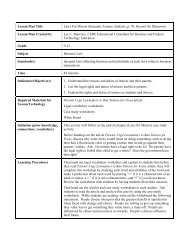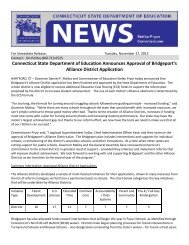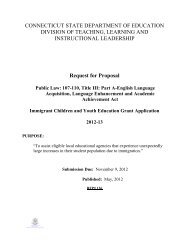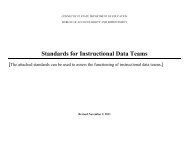Early Childhood - Connecticut State Department of Education
Early Childhood - Connecticut State Department of Education
Early Childhood - Connecticut State Department of Education
Create successful ePaper yourself
Turn your PDF publications into a flip-book with our unique Google optimized e-Paper software.
Language And Literacy Development Chapter 5<br />
Principles<br />
Teaching young children<br />
involves making decisions:<br />
when to use direct instruction,<br />
facilitation and support<br />
depending on the children, the<br />
objectives and the setting.<br />
Parents and families must be<br />
recognized and supported as key<br />
partners in nurturing children’s<br />
literacy development.<br />
LANGUAGE DEVELOPMENT<br />
Performance Standards<br />
Speak clearly, including use <strong>of</strong> appropriate tone and<br />
inflection.<br />
Use multiple-word sentences or phrases to describe<br />
ideas, feelings and actions.<br />
Speak to initiate a conversation or enter into a play<br />
situation.<br />
Speak for a variety <strong>of</strong> purposes.<br />
Use multiple-word sentences or phrases to describe<br />
ideas, feelings and actions.<br />
Demonstrate understanding <strong>of</strong> basic conversational<br />
vocabulary.<br />
Preschool children exhibit varying skill levels<br />
depending on their individual development, home<br />
environment and experiences. Children develop oral<br />
language skills in a natural and sequential order as<br />
a result <strong>of</strong> interacting with others. Initially, children<br />
Quotes From Research<br />
“….the need for teachers<br />
to make intentional efforts<br />
to push children’s thinking<br />
and support their literacy<br />
development as they converse<br />
with children throughout the<br />
day, plan their classroom<br />
day and the content <strong>of</strong> the<br />
curriculum, and organize their<br />
classroom environment. For<br />
a teacher to provide children<br />
optimal supports in all these<br />
areas, he or she must have<br />
a deep understanding <strong>of</strong><br />
what children need, skillful<br />
ability to provide appropriate<br />
experiences throughout the<br />
day, and the willingness to<br />
expend the energy needed<br />
to support children’s<br />
development all day long.<br />
These are the qualities <strong>of</strong><br />
intentional teaching.”<br />
“You may have tangible<br />
wealth untold: Caskets <strong>of</strong><br />
jewels and c<strong>of</strong>fers <strong>of</strong> gold.<br />
Richer than I you can never<br />
be- I had a Mother who read<br />
to me.”<br />
73<br />
Source<br />
Dickinson & Tabors, (2001)<br />
Strickland Gillian, Trelease,<br />
(2001)<br />
use language to gain attention and fulfill basic needs,<br />
imitating the language <strong>of</strong> their environment and creating<br />
their own. As children grow, oral language becomes a<br />
useful tool for communicating ideas and emotions, and<br />
for developing relationships and connecting with others.<br />
Children use language as a tool for imagining, planning<br />
and solving problems.<br />
Children need both varied experiences and<br />
opportunities to practice, to gain knowledge. Background<br />
knowledge is a key predictor for successful reading<br />
comprehension. Opportunities to hear and practice<br />
sophisticated vocabulary are key to strengthening<br />
background knowledge, as well as emerging skills.<br />
Children need multiple purposes for using language,<br />
strong models <strong>of</strong> appropriate language use and an<br />
audience. Interesting opportunities to label, categorize<br />
and summarize information provide children with<br />
mature purposes for use <strong>of</strong> oral language and listening<br />
skills. As children use language to describe and sort, they<br />
develop relationships, concepts and understandings, and<br />
enhance their thinking skills.



